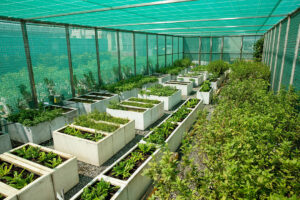A TOUR of the bones of City of Dreams Manila’s structure on April 24 revealed a lot of the property’s careful thinking about sustainability. They’re reaching for a goal, see: they plan to be carbon-neutral and zero-waste by 2030, as per instructions from the very top of its parent company, Melco Resorts & Entertainment Limited.
With several other media guests, BusinessWorld went to the back of the house, where we saw their NORDAQ water filtration and glass bottling system (which costs $370,000). Through this system, the property is able to filter, distill, and bottle the water that appears all around the site. By churning out hundreds of water bottles by the hour, as well as other sustainability initiatives, the property has reduced its use of single-use plastics and was able to divert 11.6 million single-use plastic units away from landfills.
Next on the tour was their e-bike charging stations, for use by employees, by the parking building. This is coupled with 3,120 PV solar panels that can generate 1,600 MWh annually. The number seems large, but it only powers a small percentage of the power needed for the resort. No matter: they’re diverting P30 million to add 612 more units to further increase their solar power capabilities, and as of the time of writing, they were currently being installed.
The little solar power farm on the roof deck stood next to another farm: their plant nursery and herb garden. One wonders about the number of plants that they have, but we were told that these were used for indoor decorations, and the plants take shifts: by the time one plant needs sunlight, it’s taken back to the nursery and another plant takes its place. By the plant nursery was a vermicompost facility, where the property’s food waste is taken and processed to be fed to worms, whose now-nutrient rich secretions are used to fertilize the plants. Around 145 metric tons of food waste have been processed there. The worms, in return, have produced seven metric tons and 3,300 liters of vermicast and vermitea (solid and liquid natural fertilizer), just over the year.
These are used to nurture the herb garden, used to supplement their chefs’ supplies. Here we saw thyme, basil, mint, and even microgreens. The garden can produce 276 kilograms of fresh herbs.
Then there is the property’s food waste composting machine, which harnesses microbial technology to compost food waste. The byproduct of this is an immature compost that can be used as a soil amendment in various horticulture applications, which the property gives to farmers. The property turned over about 896 kg of compost to its partner farmers last March.
All of these are part of Melco’s Above and Beyond sustainability strategy. In a video shown at the end of the tour (where guests repotted basil plants to take home, and were served dishes flavored with the herb garden’s produce), Melco’s Chair and CEO said, “Whatever we design today must be better than yesterday. Cleaner, healthier, safer, and more sustainable.”
“This is not an option, or a requirement. It’s just the way we do things, the way we look at the world, and the way we want the future to look back at us,” he said. “Above and Beyond will make sure our guests can have the time of their lives. And I can look my daughter in the eye.” — Joseph L. Garcia
